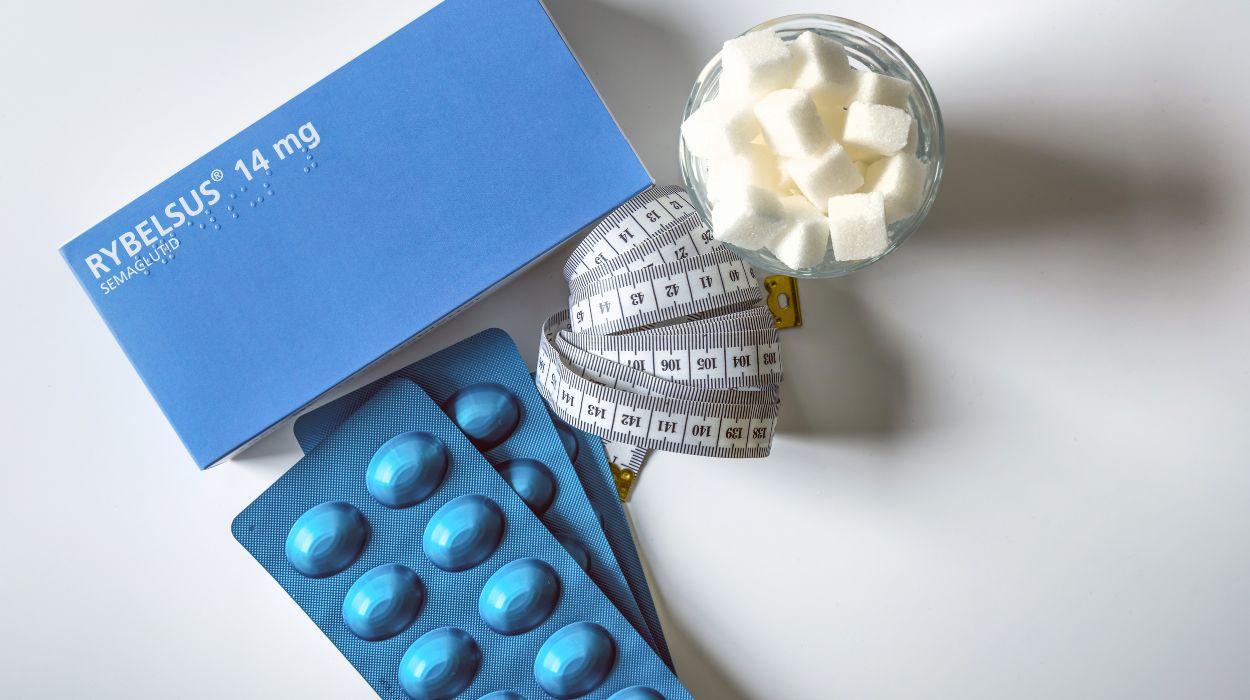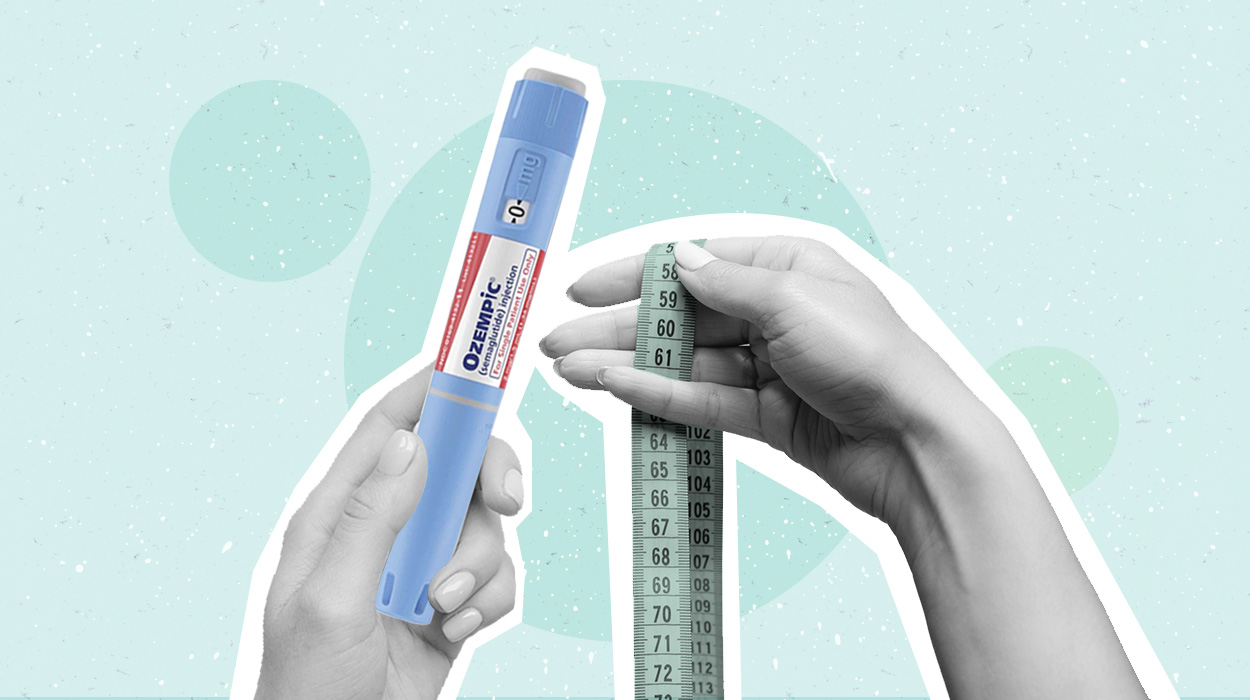In our modern society, there’s a surplus of readily available unhealthy foods. Combined with stressful and sedentary lifestyles, it’s no wonder it’s so hard to lose weight. Obesity is rising, and frustrated people are looking for medical solutions.
Recently, taking Ozempic, an injectable medication for treating type 2 diabetes,[1] has become so famous. The active compound in Ozempic, semaglutide,[2] helps people lose weight.
But there’s no magical pill that can make you lose weight forever. Healthy habits, such as a balanced diet, exercise, and monitoring daily carbs, are key to maintaining a healthy weight. Plus, studies that used Ozempic for weight loss also included healthy lifestyle interventions.
One major drawback of Ozempic is that it’s an injection. So, are there Ozempic pills for weight loss? Read on to find out your options and their potential risks.
Are There Ozempic Pills For Weight Loss?
Yes, Ozempic’s active ingredient, semaglutide, exists as a pill. The company that makes Ozempic also makes the pill, under the name Rybelsus. Like Ozempic, Rybelsus is approved to treat type 2 diabetes. It’s not technically a weight loss pill, but it can help you lose weight.
Do Ozempic Pills For Weight Loss Exist?

A version of Ozempic exists in pill form under the name Rybelsus.[3] It has the same active ingredient as Ozempic, semaglutide. Rybelsus has also been FDA-approved to treat type 2 diabetes, not obesity.
Semaglutide mimics GLP-1, a hormone that regulates appetite[4] and decreases blood sugar. It also slows digestion, meaning food stays in your stomach for longer. This can make you feel fuller for more time, reducing how often you get hungry.
It’s important to note that both Ozempic and Rybelsus are FDA-approved for people with type 2 diabetes, not the general population. However, many healthcare providers are prescribing it off-label for weight loss.
How To Use Ozempic For Weight Loss
Semaglutide success requires that you adopt healthy habits,[5] like eating less processed foods and exercising regularly.
Naturally, studies show that once participants stop taking the diabetes drug, they regain much of the weight[6] they lost. This is especially true if you take a higher dose.
Unless you adopt a holistic approach to weight loss, you will gain weight after stopping semaglutide pills or injections.
Consider speaking to a dietitian and therapist to learn how to develop healthier habits and manage stress, which can increase cravings and lead to weight gain.[7] Otherwise, if you just want to lose weight fast without exercise or eating well, you’re more likely to regain the weight lost with a drug.
In addition to healthy habits, people with diabetes must carefully monitor their daily carb intake to lose weight safely.
Another important habit is to drink water to lose weight since hydration can help control blood sugar levels. Finally, health and wellness supplements like multivitamins might be helpful if you have any nutrition deficiencies.
Why Are Drugmakers Trying To Make Ozempic Pills?
Drugmakers are continuously striving to make drugs more available, safer, and effective for the public. Creating an oral pill form of Ozempic for weight loss has several advantages, such as:
Improve Patient Compliance And Adherence
Pills are generally easier to take and more convenient than a weekly injection. Also, oral medication avoids any fear or discomfort of needles.
Reduced Healthcare Costs
Since pills are easily self-administered they can be cheaper for the healthcare system and patients. Adherence also increases when you can afford the drug.
Potential For Increased Profit
Let’s face it, drug companies are businesses. They want their drugs to be as successful and easily accessible as possible to make a profit.
Pills are easier to take than injections and therefore reach a larger demographic. That means increased prescriptions and higher revenue for the company. Also, if people are more likely to take the drug as pills, they may stay on the medication for longer, also helping the company’s financial success.
So, while the primary goal of any pharmaceutical development should always be to improve patient health and well-being, their financial incentives also can’t be entirely ignored. Successful medications and increased revenue can be used for further research and development. This can create a positive cycle that benefits both the company and patients.
Other Weight Loss Drugs To Consider
Here are some FDA-approved weight loss drugs you can discuss with your healthcare professional:
Phentermine

You might have seen the brand names Adipex-P[8] or Lomaira[9] available as weight loss pills. The active constituent is phentermine,[10] which acts as an appetite suppressant. It affects the brain by altering certain neurotransmitters. Side effects include increased blood pressure, constipation, nervousness, insomnia, and heart palpitations.
Phentermine is prescribed for short-term use, usually for a few weeks, in conjunction with lifestyle changes. These include exercise, eating nutritious foods, and aiming for a calorie deficit to lose weight.
Orlistat
The brand name Xenical is prescribed,[11] while Alli is an over-the-counter medication. These drugs exist as pills with the active constituent orlistat. Orlistat[12] decreases the absorption of fat from the gastrointestinal tract.
While it can be used long-term, medical professionals still recommend adopting a healthier lifestyle while taking the drug. Common side effects include oily stools, gas, and frequent bowel movements.
Liraglutide
Liraglutide is an injected medication similar to Ozempic. It is sold under the brand name Saxenda[13] or Victoza.[14] The active ingredient, liraglutide, has the same effect as that in Ozempic. This helps to regulate appetite and food intake.
Liraglutide needs to be injected daily and can be used long-term. However, side effects are common. These include nausea, vomiting, diarrhea, constipation, and an increased risk of pancreatitis and thyroid tumors.
Keep in mind that every drug has its potential side effects. Always thoroughly research the risks and speak to your doctor before starting or changing any medication.
Conclusion
The active ingredient in Ozempic, semaglutide, is available as a pill under the brand name Rybelsus.
This drug works to suppress your appetite and stabilize blood sugar cravings. However, it comes with side effects, such as gastrointestinal problems and changes in heart rate. More severe risks include pancreatitis, thyroid cancer, and kidney problems.
If you’re interested in medication to help you lose body weight, speak to your healthcare provider, registered dietitian, and therapist to learn how to manage stress and develop healthier lifestyle habits. While the drug shows promise, it requires important lifestyle changes.
Frequently Asked Questions
Ozempic doesn’t exist in pill form for weight loss, but its active ingredient, semaglutide, does. The pill Rybelsus is FDA-approved to treat type 2 diabetes, not obesity. It works to suppress appetite and regulate blood sugar levels.
Rybelsus is a pill that contains the same active constituent, semaglutide.
Wegovy[15] is a weight loss medication, made explicitly for obese people. Clinical trials show a mean loss of around 10%[16] after 20 weeks, but excess weight regain is likely after stopping the drug.
Ozempic and Wegovy are similar, but Wegovy is approved for weight loss and made explicitly as an overweight and obesity medicine. Ozempic, on the other hand, is to treat people with type 2 diabetes.
 Evidence Based
Evidence Based
